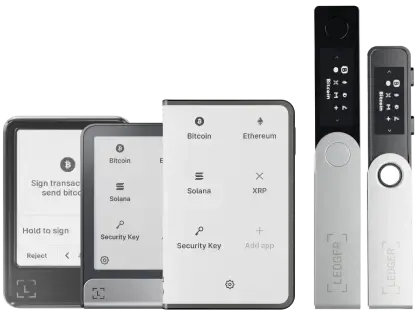Thought leadership | 08/18/2020
What you need to know before buying your first crypto

When you want to start investing in or even trading cryptocurrency, there is a lot that you need to take care of first. Here are some tips that could help you before buying crypto.
Choose the right Wallet
One of the first and most important things that you should care about is how you are planning to store your digital assets. A crypto wallet is essentially just a cryptographic key pair, consisting of a public key (which you can disclose to others so that they can send you funds) and a private key (which is needed to access your funds).
Private key and Recovery Phrase
Storing cryptocurrency thus means that you – and only you – are in possession of the private key. Of course you can always give your digital assets into custody, for example by keeping them on the exchange that you bought the assets from. This however means that you have to trust the custodian to take good care of your money, which oftentimes, they do not. In the past, numerous exchanges have lost their customer’s funds due to hacks and/or insolvency.
You should therefore get acquainted with storing digital assets in your own wallet. Always remember that if you lose the private key, you cannot access your funds anymore, which means that they are most likely lost forever. If somebody else gains knowledge of your private key, they can steal your funds. So make absolutely sure to keep your private key both secret and secure.
In practice, what you will be using in order to recover your private key for any wallet type is a mnemonic seed phrase consisting of a number (usually 12 or more) of simple English words. Do not store these words digitally in order to shield them from hackers. Also, never share your private key or the corresponding seed phrase with anyone, unless you want to give them access to your money.
As a start, you can simply write the seed phrase down on a sheet of paper and store it at some place where you can find it again if necessary. There are also a variety of metal wallets available. These are metal cases, which let you engrave your seed phrase, making it relatively fire-resistant and waterproof.
Wallet types
As for wallet types, these differ in the way they store keys. In a cold wallet, they are stored in offline devices that are not connected to the Internet. This way, they are not vulnerable to cyber-attacks. For some time, it was quite common to simply print out the public and private key, thus creating a paper wallet. With the advent of affordable hardware wallets, like our own Ledger Nano series, this practice has faded away almost completely. Hardware wallets are small USB devices that can sign transactions and transmit the signed transaction to an internet-connected computer. The private key therefore never leaves the device.
In contrast, hot wallets are software products that run on an internet-connected device, like a phone. These wallets are likely in the form of an app for making payments, which makes them more user-friendly. However, hot wallets, as they are connected to the internet, are more vulnerable to cyber-attacks. That said, for institutional investors and financial institutions there are now solutions like the Ledger Vault offering the best of both worlds.
Custodians and Exchanges
As mentioned earlier, you can also give your cryptocurrency into custody, for example by storing them on a centralized exchange. This is rather controversial as it contradicts the idea of decentralization. Also, hacks against exchanges and bankruptcies have been a common occurrence in the past.
However, custodians are getting constantly better at keeping their users’ funds safe. This is also the reason why some exchanges elect to work together with a third-party custodian, rather than carrying the burden of having to store their users’ private keys themselves.
There are some qualities by which you can identify a trustworthy custodian. They should store all, or at least the vast majority of user funds in cold wallets, or better yet, use a system like the Ledger Vault. Also, it can be helpful if the exchange has insurance against hackers. At the very least, custodians should be regulated and comply with the laws in their home jurisdiction, such as conducting KYC/AML checks.
Whether or not you decide to keep your coins on an exchange, or take them into self-custody, you should make sure to pick a trustworthy solution in order to buy and trade cryptocurrency. Besides the same consideration as with centralized custodians, you should also compare the fee rates of exchanges, especially for fiat to crypto transactions.
It goes without saying that you should keep the password to the exchange secret. Employees of the exchange will never ask you for your password. Also beware of phishing. When entering your password, always double-check that you are on the official website of the exchange. Another important step towards security is activating two-factor authentication (2FA). Some exchanges even make 2FA mandatory, which is for a good reason to stop you losing your crypto funds. Make therefore sure that 2FA is activated for all safety-critical actions.
There is more than just Bitcoin
While Bitcoin is the first and most well-known cryptocurrency, it is far from the only one. Over the years, a myriad of so-called altcoins have emerged. Quite a few of them came into existence simply by copying the transaction history of Bitcoin. Others have tried different methods of distributing the coins.
Many of those altcoins don’t really serve as payment methods, but as utility tokens, which have some function within a blockchain network. As a general rule, it is probably not a good idea to buy a token or a coin, if you don’t at least understand its function. Also, you should keep in mind that investing in cryptocurrencies can be risky, as these are highly volatile assets.
There are some measures that you could take to potentially decrease the risk. Investing in Proof of Stake coins could give you some additional reward for holding them. Usually, for staking, there are other steps that you need to take in order to receive rewards, but some exchanges are willing to do the task for you if you share the rewards with them. With Proof of Stake coins, you are still subject to volatility, but if you end up losing money, your staking rewards offset some of your losses.
Likewise, you could invest your cryptocurrency in Decentralized Finance (DeFi) platforms, which could earn you a yield/interest rate that is paid out in real-time. This also works with stablecoins such as Tether (USDT), which are usually pegged to the value of one US-Dollar. This way, you could avoid the volatility of cryptocurrencies, but still earn a yield that is substantially higher than the interest rates at most banks. Keep in mind that DeFi platforms consist of decentralized smart contracts that can be hacked as well. If that is the case, there is nobody you can hold liable for the loss of your funds. Therefore, you have to do your own research in order to find a DeFi platform that is safe to use.
Always bear in mind that you have to make an educated choice as to when you need to buy and at what price. Again, do you own research before entering the game and make sure that your Bitcoins are kept safe, either with a trustworthy custodian, or in your own secure crypto wallet.
This makes up the majority of what you need to know before buying crypto for the first time. We hope you choose to follow these steps and wish you the best of luck on your journey to crypto riches and knowledge.
The content you are reading is for informational purpose only. Nothing contained in this article constitutes a solicitation or recommendation to buy or sell crypto-assets in this or in any other jurisdiction in which such solicitation could be unlawful under the laws of the country.
Before using the services, please educate yourself to make informed decisions. Crypto assets are volatile. Carefully evaluate your goals and the financial risk you are willing to take. Please be aware that Ledger does not provide financial, tax, or legal advice. Decisions to perform operations involving crypto assets should be taken on your own or rely on opinions of reliable and qualified experts.
































